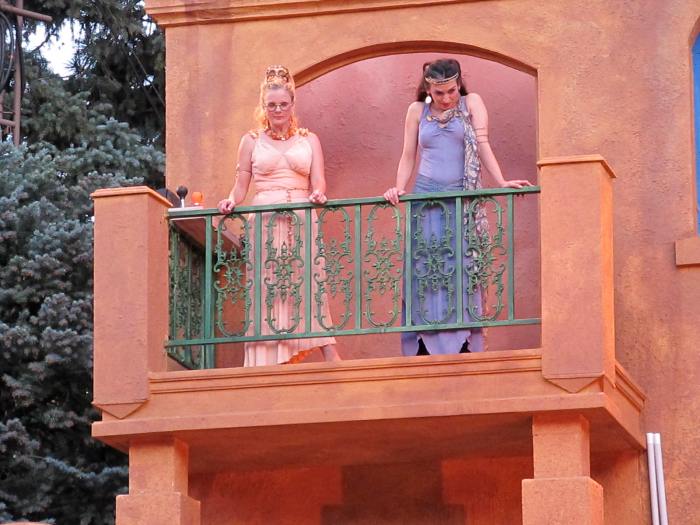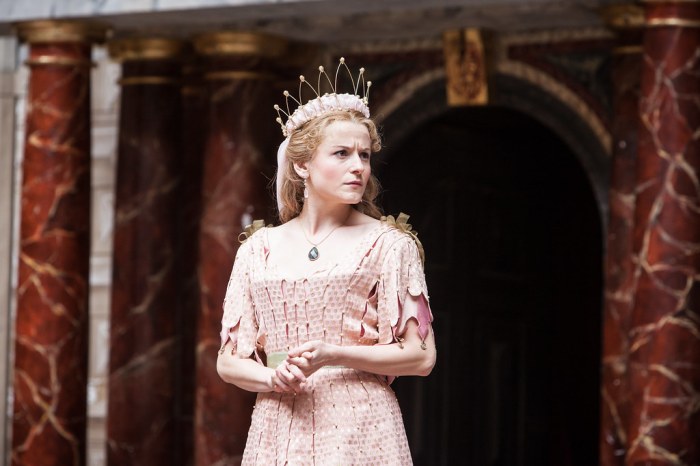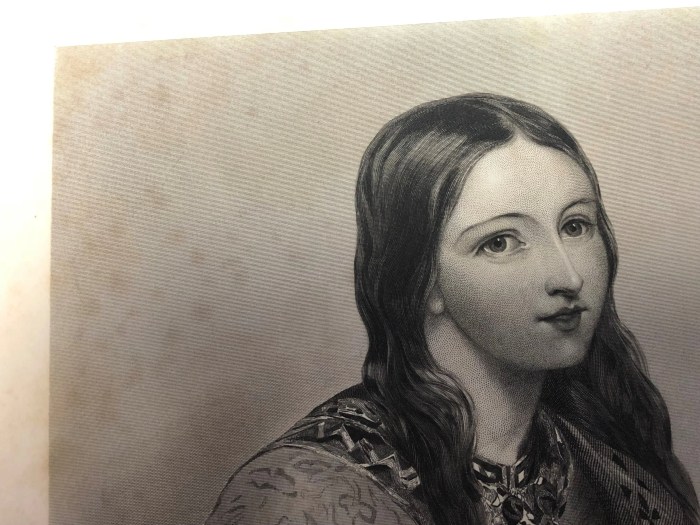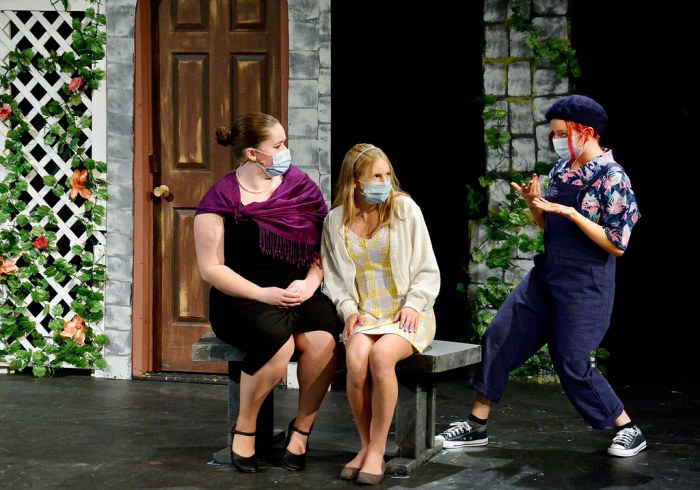Luciana the comedy of errors – Luciana: The Comedy of Errors sets the stage for this enthralling narrative, offering readers a glimpse into a story that is rich in detail and brimming with originality from the outset. Luciana, a central figure in the play, emerges as a beacon of clarity and reason amidst the chaos that unfolds, captivating readers with her wit, wisdom, and unwavering spirit.
Her sharp observations and insightful commentary provide a unique perspective on the events that transpire, shedding light on the play’s themes of identity, mistaken identity, and the nature of love. Through her interactions with the other characters, especially her brothers, Luciana’s role becomes pivotal in unraveling the tangled threads of confusion and restoring order to the chaotic world of the play.
Character Analysis: Luciana

Luciana is a minor character in The Comedy of Errors, but she plays a significant role in the resolution of the play’s central conflict. She is the sister of the Antipholus twins and the wife of Antipholus of Ephesus.Luciana is a strong and intelligent woman.
She is able to see through the confusion and chaos that surrounds her and to help others to understand what is happening. She is also a loyal and loving sister and wife.Luciana’s relationship with her brothers is complex. She loves them both, but she is also aware of their flaws.
She is often frustrated by their immaturity and recklessness, but she is always there for them when they need her.
Relationship with the Antipholus Twins
Luciana’s relationship with the Antipholus twins is particularly interesting. She is able to tell them apart, even when they are disguised as each other. This suggests that she has a deep understanding of their personalities and their motivations.Luciana is also able to see the good in both of her brothers.
She knows that they are both capable of great things, even when they are at their worst. This is evident in the scene where she convinces Antipholus of Syracuse to return to his wife and family.
Luciana’s Role in the Resolution of the Play
Luciana plays a key role in the resolution of the play. She is the one who finally reveals the truth about the Antipholus twins and their long-lost father. This revelation leads to the happy ending of the play.Luciana is a complex and well-developed character.
She is a strong and intelligent woman who is loyal and loving. She is also a key figure in the resolution of the play’s central conflict.
Themes Related to Luciana

Luciana’s character embodies several significant themes in “The Comedy of Errors.” These themes contribute to the play’s exploration of identity, mistaken identities, and the power of love.
Identity and Mistaken Identities
Luciana’s interactions with the Antipholus twins highlight the confusion and chaos caused by mistaken identities. Her encounters with the wrong twin lead to misunderstandings and conflicts, emphasizing the difficulty of discerning true identities in a world of deception and confusion.
Love and Marriage
Luciana’s relationship with Antipholus of Syracuse explores the complexities of love and marriage. Her initial reluctance to accept his advances reflects the social expectations and constraints placed on women in the play’s Elizabethan society. However, her eventual acceptance of Antipholus demonstrates the power of love to overcome obstacles and defy social norms.
Gender Roles and Expectations, Luciana the comedy of errors
Luciana’s experiences shed light on the gender roles and expectations of her time. As a woman, she is expected to be subservient and obedient, but her intelligence and assertiveness challenge these traditional notions. Her character encourages audiences to question the limitations imposed on women in society.
Literary Devices Used in Luciana’s Characterization

Luciana’s character in The Comedy of Errors is brought to life through a combination of literary devices. These devices effectively portray her as a witty, intelligent, and self-assured woman, contributing to the play’s overall impact.
Luciana the Comedy of Errors is a play by William Shakespeare. It is one of his most popular comedies and is often performed around the world. In the play, two sets of identical twins are separated at birth and end up in different parts of the world.
The play is full of mistaken identities and hilarious misunderstandings. If you’re interested in learning more about power inserters, this article provides a comprehensive overview of the topic. Back to Luciana the Comedy of Errors, the play ends with the twins being reunited and everyone living happily ever after.
Foreshadowing
Foreshadowing is used to hint at Luciana’s future role as a mediator and peacemaker. In Act I, Scene II, she advises her sister Adriana to “be patient” and “bear with [Antipholus of Ephesus] for the time.” This foreshadows Luciana’s ability to resolve conflicts and bring about a harmonious resolution.
Irony
Irony adds depth to Luciana’s character. While she is perceived as wise and rational, she also experiences romantic confusion. In Act III, Scene II, she initially mistakes Antipholus of Syracuse for her husband, demonstrating her vulnerability despite her intelligence.
Metaphor
Metaphors are used to create a vivid portrayal of Luciana’s character. In Act IV, Scene II, she describes her love for Antipholus of Syracuse as “a fire that burns not bright but lingers long.” This metaphor captures the intensity and enduring nature of her emotions.
Rhetorical Questions
Luciana’s use of rhetorical questions highlights her intelligence and self-assurance. In Act II, Scene I, she asks, “Who should be silent but the tongue of scandal?” This question emphasizes her ability to confront and challenge societal norms.
Symbolism and Imagery Associated with Luciana
Luciana is associated with several symbols and imagery throughout the play, each contributing to her characterization and the play’s overall meaning.
Purity and Innocence
Luciana is often associated with purity and innocence. This is evident in her name, which means “light” or “shining one.” She is also described as being “chaste” and “virtuous.”
Luciana’s purity and innocence are also symbolized by her association with the moon. In Act II, Scene I, she is described as being “like the moon, that shines by night.” The moon is often associated with purity, chastity, and fertility.
Wisdom and Knowledge
Luciana is also associated with wisdom and knowledge. This is evident in her role as a counselor to her sister, Adriana. Luciana often provides Adriana with wise advice and support.
Luciana’s wisdom and knowledge are also symbolized by her association with the sun. In Act II, Scene I, she is described as being “like the sun, that shines by day.” The sun is often associated with knowledge, enlightenment, and wisdom.
Nature and Fertility
Luciana is also associated with nature and fertility. This is evident in her association with the earth. In Act II, Scene I, she is described as being “like the earth, that yields her increase.” The earth is often associated with fertility, abundance, and nourishment.
Luciana’s association with nature and fertility is also symbolized by her association with flowers. In Act IV, Scene IV, she is described as being “like a flower, that blooms in the spring.” Flowers are often associated with beauty, youth, and fertility.
Luciana’s Role in the Resolution of the Play

Luciana’s wisdom, clarity, and unwavering composure play a pivotal role in unraveling the tangled web of confusion that permeates the play. Her actions and words serve as a beacon of reason, guiding the characters toward reconciliation and resolution.
Her Role in Resolving the Confusion
- Unraveling the Mistaken Identities:Luciana’s clear understanding of her brother’s and husband’s identities helps her to see through the mistaken identities that have caused chaos. She confronts the twins, Antipholus of Syracuse and Antipholus of Ephesus, and their servants, Dromio of Syracuse and Dromio of Ephesus, exposing their confusion and forcing them to confront the truth.
- Exposing the Schemes:Luciana’s keen observation and logical reasoning enable her to uncover the schemes of Adriana and her sister, the Abbess. She unravels the Abbess’s plot to separate Antipholus of Ephesus from Adriana and exposes Adriana’s jealousy and possessiveness, paving the way for reconciliation.
Restoring Order and Harmony
- Promoting Reconciliation:Luciana’s calm demeanor and persuasive words help to bridge the gaps between the estranged characters. She appeals to their reason and encourages them to put aside their differences, leading to the restoration of harmony and understanding.
- Restoring Identity:Luciana’s unwavering belief in the truth and her insistence on the proper recognition of her brother and husband contribute to the restoration of their identities. She stands as a testament to the importance of truth and clarity, ultimately leading to the resolution of the play’s central conflict.
Contributing to the Play’s Comedic Tone
- Comic Relief:Luciana’s witty remarks and sharp observations provide moments of comic relief amidst the chaos and confusion. Her ability to see through the absurdities of the situation and her unwavering determination to find a solution add a humorous element to the play.
- Irony and Satire:Luciana’s character serves as a source of irony and satire. Her clear understanding of the situation highlights the foolishness of the characters who are caught up in the confusion. Her sharp wit and incisive comments gently poke fun at the characters’ shortcomings, adding to the play’s comedic tone.
Detailed FAQs: Luciana The Comedy Of Errors
Who is Luciana in The Comedy of Errors?
Luciana is the sister of the Antipholus twins, a central character in the play who serves as a voice of reason and clarity amidst the chaos.
What is Luciana’s relationship with her brothers?
Luciana has a close relationship with her brothers, often providing them with guidance and support. She is also aware of their mischievous nature and often attempts to keep them in check.
What are some of the themes explored through Luciana’s character?
Luciana’s character explores themes such as mistaken identity, the nature of love, and the power of female agency.
How does Luciana contribute to the resolution of the play?
Luciana’s actions and words play a crucial role in resolving the confusion and restoring order to the play’s chaotic world.